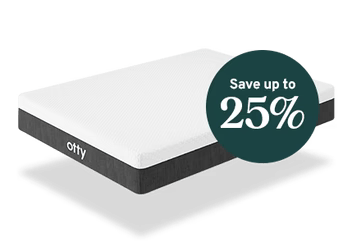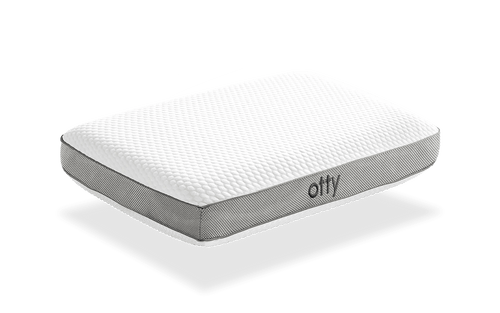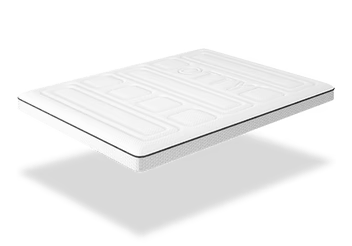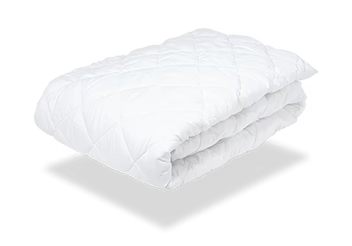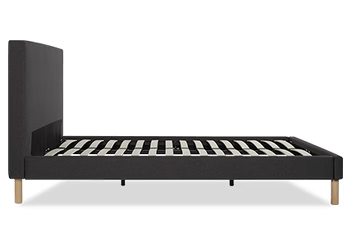Hip pain can transform a good night's sleep into hours of discomfort and restless tossing. If you wake up with aching hips or struggle to find a comfortable sleeping position, your mattress might be the culprit. The right mattress can make a significant difference in managing hip pain and improving your sleep quality.
In this guide, we'll explore how to choose a mattress that provides the support and pressure relief your hips need, helping you wake up refreshed rather than in pain.
Can Your Mattress Cause Hip Pain?
The answer is yes. Research by Jeffrey N. Katz, M.D., Professor of Medicine and Orthopaedic Surgery at Harvard Medical School, found that people using properly supportive mattresses reported significantly less lower back and hip pain during rest compared to those on unsuitable mattresses.
When your mattress doesn't provide adequate support, several problems occur:
Misalignment: Your spine, hips, and shoulders fall out of natural alignment. This forces your muscles to work overtime trying to maintain proper positioning, leading to morning stiffness and pain.
Pressure point buildup: Areas like your hips bear excessive weight, creating painful pressure points that disrupt sleep and cause discomfort.
Inadequate support: Soft or worn mattresses allow your body to sag into unnatural positions, contorting your spine and creating strain on your hip joints.
Loss of cushioning: As mattresses age, they lose their ability to provide both support and cushioning, exacerbating existing hip problems or creating new ones.
If your mattress is more than 7-8 years old or shows visible sagging, it's likely contributing to your hip pain.
The pain can make it difficult to fall asleep in the first place. The discomfort can keep your mind active, making it harder to relax and drift off. This can lead to a vicious cycle where the lack of sleep exacerbates the hip pain, which in turn further disrupts sleep.
In addition, the pain can also affect the quality of your sleep in more subtle ways. For instance, it can cause you to toss and turn throughout the night, leading to fragmented and less restful sleep. This constant movement can also disturb a sleeping partner, affecting their sleep quality as well.
What Your Hips Need From A Mattress
Finding the right mattress for hip pain requires balancing two critical factors: support and pressure relief.
Support: Maintaining Proper Alignment
Your mattress should keep your spine in neutral alignment, with your hips, shoulders, and spine forming a straight line (when viewed from behind) regardless of your sleeping position. When alignment is off, your muscles compensate, leading to pain and stiffness.
Pressure Relief: Distributing Your Body Weight
Your hips are a major pressure point, especially for side sleepers. The right mattress distributes your body weight evenly, preventing your hips from bearing excessive pressure while you sleep.
Mattress Firmness: Finding Your Sweet Spot
One of the most important decisions when choosing a mattress for hip pain is firmness level. However, there's no one-size-fits-all answer – the ideal firmness depends on your sleeping position, body weight, and personal preferences.
Firmness Scale Explained
Mattresses are typically rated on a scale from 1-10:
1-3: Very soft
4-5: Medium-soft
6: Medium
7-8: Medium-firm
9-10: Very firm
Firmness by Sleeping Position
Side Sleepers: If you sleep on your side, you need a medium-soft to medium mattress (4-6 firmness). Your hips and shoulders bear most of your body weight in this position, so you need enough give to cushion these pressure points while maintaining spinal alignment. A mattress that's too firm will create painful pressure on your hip joint.
Back Sleepers: Back sleepers typically do well with medium to medium-firm mattresses (6-7 firmness). This provides support for your lower back while allowing your hips to sink slightly for comfort.
Stomach Sleepers: Stomach sleeping requires firmer support (7-8 firmness) to prevent your hips from sinking too deeply, which can create an uncomfortable arch in your lower back.
Body Weight Considerations
Lighter individuals: Often need softer mattresses to achieve adequate contouring and pressure relief. A mattress that's too firm won't contour to your body, creating gaps and pressure points.
Average weight: Have the most flexibility and can usually choose based primarily on sleeping position and preference.
Heavier individuals : Typically need firmer mattresses to prevent excessive sinkage. OTTY offers a specifically designed firm hybrid mattress suitable for those over 15 stone.
Choosing the Right Mattress Type
When it comes to choosing the right mattress type for hip pain, there are several options to consider:
Innerspring Mattresses
These traditional mattresses use a system of metal springs for support. While they can offer good support, they may not provide the best pressure relief for hip pain sufferers.
Memory Foam Mattresses
Known for their pressure-relieving properties, memory foam mattresses can contour to the body and distribute weight evenly. This can be particularly beneficial for those with hip pain.
Latex Mattresses
Similar to memory foam, latex mattresses offer good pressure relief. They are also more responsive than memory foam, which some people prefer.
Hybrid Mattresses
These mattresses combine the best of innerspring and foam or latex mattresses. They often feature a coil support core with a comfort layer of foam or latex on top, providing a balance of support and pressure relief.
The best mattress for hip pain is one that provides the right balance of support and pressure relief for your specific needs.
Check out OTTY's hybrid mattress collection.
Best Mattress Types for Hip Pain
Different mattress constructions offer distinct benefits for hip pain sufferers. Here's what you need to know about each type:
Memory Foam Mattresses
Memory foam was originally developed by NASA to withstand G-forces, and it excels at pressure relief – making it an excellent choice for hip pain.
Benefits for hip pain:
Contours precisely to your body shape, cradling your hips and reducing pressure points
Distributes body weight evenly across the surface
Provides targeted support where you need it most
Minimises motion transfer if you share your bed
Considerations:
Can sleep warmer than other mattress types (look for gel-infused or cooling technologies)
May feel like you're "sinking in" which some people dislike
Can make it harder to change sleeping positions
Memory foam works best for side sleepers and those with chronic hip pain who need maximum pressure relief.
Hybrid Mattresses
Hybrid mattresses combine the pressure relief of foam with the support of pocket springs, offering balanced performance.
Benefits for hip pain:
Foam comfort layers provide pressure relief for your hips
Pocket springs offer responsive support and maintain spinal alignment
Better temperature regulation than all-foam mattresses
Easier to move around on during the night
Strong edge support makes getting in and out of bed easier
Considerations:
Can be more expensive than foam-only mattresses
Quality varies significantly between brands
OTTY's hybrid mattresses, such as the Pure Hybrid Bamboo Mattress with Charcoal and the Original Hybrid Mattress, combine memory foam layers with pocket spring support, providing both pressure relief and support for hip pain sufferers.
Latex Mattresses
Natural latex provides a responsive, bouncy feel with excellent pressure relief.
Benefits for hip pain:
Provides firm yet cushioning support
More responsive than memory foam – easier to change positions
Naturally cooler sleeping surface
Durable and long-lasting
Naturally hypoallergenic
Considerations:
Can be expensive
Heavier and harder to move
Some people don't like the "bouncy" feel
Latex works well if you toss and turn at night or find memory foam too enveloping.
Innerspring Mattresses
Traditional innerspring mattresses use metal coils for support, often with minimal cushioning layers.
For hip pain:
Generally not recommended unless they have substantial comfort layers
Older or basic innerspring mattresses lack the pressure relief hip pain sufferers need
Can create pressure points, especially for side sleepers
If choosing innerspring, opt for pocket sprung models with thick comfort layers
Additional Features to Consider
Beyond mattress type and firmness, several features can enhance comfort for hip pain:
Zoned Support
Some mattresses feature zoned construction with different firmness levels for different body areas. Typically, these provide:
Softer support for shoulders and hips (side sleepers)
Firmer support for your core and lower back
Medium support for your legs
This targeted approach can be particularly beneficial for side sleepers prone to hip pain.
Temperature Regulation
Pain often feels worse when you're overheating. Look for mattresses with:
Gel-infused memory foam
Open-cell foam construction
Breathable covers (like bamboo fabric)
Cooling technologies
OTTY's range of cooling mattresses feature technology specifically designed for hot sleepers.
Motion Isolation
If you share your bed, motion isolation prevents your partner's movements from disturbing your sleep, which is important when you're trying to maintain a pain-free position.
Check out our range of motion isolation mattresses
Sleeping Positions and Tips for Hip Pain
Even the best mattress can't overcome poor sleeping positions. Here's how to optimise your sleep for hip pain relief:
For Side Sleepers
Side sleeping is the most common position but places significant pressure on your hips.
Best practice:
Place a pillow between your knees to keep your hips aligned
Ensure your pillow keeps your head and neck aligned with your spine
Try alternating which side you sleep on throughout the night
Avoid tucking your knees too tightly toward your chest
See our mattresses for side sleepers.
For Back Sleepers
Back sleeping can be good for hip pain if done correctly.
Best practice:
Place a pillow under your knees to maintain your spine's natural curve
This reduces pressure on your lower back and hips
Use a pillow that supports your neck without pushing your head too far forward
For Stomach Sleepers
Stomach sleeping is generally not recommended for those with hip pain as it can create an uncomfortable arch in your lower back.
If you must sleep on your stomach:
Place a thin pillow under your hips and lower abdomen
Use a very thin pillow (or none) under your head
Consider gradually transitioning to side or back sleeping
Summary and Key Takeaways
Choosing the right mattress for hip pain isn't about finding the single "best" option, it's about finding the best option for your specific needs.
Consider your sleeping position, body weight, temperature preferences, and budget. Most importantly, take advantage of trial periods to ensure your choice genuinely helps your hip pain.
Remember that while a supportive mattress is crucial for managing hip pain, it's just one piece of the puzzle.
Combining the right mattress with proper sleeping positions, regular stretching, and appropriate medical care when needed offers the best approach to pain-free sleep.
OTTY's range of hybrid and memory foam mattresses provides options for every sleep preference, all designed with pressure relief and support in mind. With a 100-night trial, you can test your choice risk-free and ensure it's truly the right fit for your needs.
